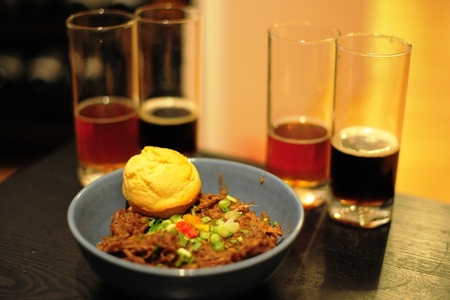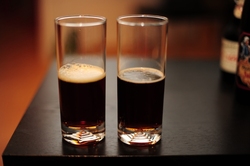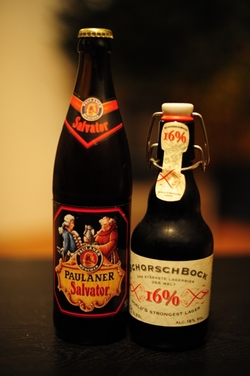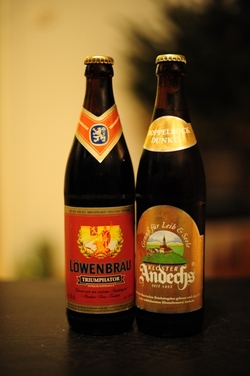German Beer Wars - Starkbier (the Dark & Dangerous Round)
 Tuesday, November 30, 2010 at 9:00
Tuesday, November 30, 2010 at 9:00 In the German Beer Wars, we've had The Power Pils Round and this weekend played with fire by holding the Dark and Dangerous Round on a Sunday night. I have to finish the homework I didn't do and go to morning German classes and Herr J has work....neither of which are things that go well with drinking superstrong beer the previous night.
Our competitors this time all come from the Starkbier classification of beer. In reality, the "strong" part of "strong beer" has to do with a tax-based classification. Beer in Germany is taxed based on the weight of the run-off that is strained off after the mashing part of the process (see here for more technical brewing and taxation info).
All four are strong lager types of beer, with 3 doppelbocks (darker, stronger lager beers traditionally brewed by the Paulaner monks in Munich for about 3 centuries). Paulaner's Salvator (meaning "Savior") is the classic Starkbier, though many breweries make one these days. Interestingly, many often name the beer with a single word ending in "-ator." Here we have Löwenbräu's Triumphator, and you can also find other Starkbiers named Celebrator, Optimator, Maximator, and so on. This is also the beer known as the "liquid bread" that the monks could drink while fasting for Lent. See here for a good rendition of the history of Starkbier.
However, in our minds, the "strong" has more to do with the alcohol content, and not only with color and taste. Let's put it this way...at 7.1% ABV, the Andechs Doppelbock Dunkel was the weakest beer of the group!
Next in line were Löwenbräu's Triumphator (Dunkler Doppelbock), with 7.6% ABV, and Paulaner's famous Salvator ("the original Starkbier"), with 7.9% ABV.
Leaving the first three in the dust, was our final competitor: SchorschBock 16%. You can likely guess from the name the alcohol content, and they proudly market it as "The Strongest Lagerbeer in the World." It is not, however, their strongest beer...SchorschBock's offerings proudly include the strongest wheat beer (13% ABV), the "formerly strongest beer in the world" (32% ABV), and The Strongest Beer in the World, clocking in at a liver-frightening 43% ABV. Why make a beer with comparable ABV to scotch? "'cause Frankonian Men don't dress like girls."
We needed something to stand up to these beers, so we tasted them with our Feng Shui Texas Chili. These are good beers to drink with a spicy and hearty chili, but the spice of the habaneros did cover up some of the flavors of the beers. So we also tasted them alone, and with only the slightly sweet cornbread.
 Feng Shui Texas Chili with Paulaner Salvator and SchorschBock 16%
Feng Shui Texas Chili with Paulaner Salvator and SchorschBock 16%
First up were the Doppelbocks:
 Andechs Doppelbock Dunkelr vs Löwenbräu Triumphator
Andechs Doppelbock Dunkelr vs Löwenbräu Triumphator
These two looked surprisingly similar in the glass, and both had a lovely dark beer smell....malty, a bit spicy and chocolaty. Though their tastes were in the same family, each had a different take on the Doppelbock variety. The Löwenbräu finished with a slightly bitter, almost hoppy ending taste; the Andechs with a sweeter, toasted caramely ending. It's really a matter of how you want your beer to taste, but we gave the win to Andechs, as we preferred the sweet finish to the bitter. (No worries to you manly beer drinkers... as it's a stronger, darker beer, it is not a beer you can really call "sweet," just a description of it's final taste. Both were great beers, very complex mix of flavors, and drinkable. Perfect for drinking on a cold night in front of a fire. However, these definitely pack quite a punch and are would be hard to drink for long beer drinking sessions!
 Then we moved on to the heavyweight championship....Paulaner's world famous Salvator starkbier vs SchorschBock's world's strongest lager. I remember Paulaner from the annual Starkbierfest as a really dark, meaty beer. However, I also realize that I never quite saw what it looked like, as it was served in the traditional pottery mugs. Don't worry, it's still a liter of beer, but the container is completely opaque.
Then we moved on to the heavyweight championship....Paulaner's world famous Salvator starkbier vs SchorschBock's world's strongest lager. I remember Paulaner from the annual Starkbierfest as a really dark, meaty beer. However, I also realize that I never quite saw what it looked like, as it was served in the traditional pottery mugs. Don't worry, it's still a liter of beer, but the container is completely opaque.
So, initially I thought it would be dark like the Doppelbocks and was certain that it was the darker of the two (see the picture above with the chili). And then I tasted them. Wow. I'm going to award extra points to any beer that makes Starkbier taste smooth and light by comparison.
Both were good, in their own ways. The Salvator was a tasty (many flavors combined together) and smooth beer. The SchorschBock did have a strong and good flavor, but was quite concentrated. I doubt I could drink much of it in a sitting as a beer, but I would definitely serve it as a sort of "beer liquer." I'd expect that's even more true for their 43% beer! But it was much more concentrated, thus tasted closer to a whisky or liquor than to a beer. but with retaining the good maltiness, cloves, burnt caramel, and other characteric tastes you may find in a darker beer.
While the SchorschBock put in a nice showing in the first quarter, it couldn't go a full game and Paulaner predictably takes another victory.
We've learned a lot so far in this little experiment, including that generally all of the Paulaner and Andechs beers are unusually good beers. So we knew that the Salvator vs Andechs Doppelbock Dunkel was going to be a tough matchup. It was. Again, this one came down to a matter of personal preference. We'd give both beers top marks, but found the Salvator to be a little smoother and drinkable. The flavors in both were outstanding, but the Starkbier just went down more smoothly. Something I really did not expect. I had thought it would be a little more bitter, and not so easy to drink. Of course, after half a maß of Starkbier it always goes down really smoothly. But I had always thought of it more as a festival beer, and not something you might drink with dinner or one evening. Another happy discovery, and I'm looking forward to celebrating Starkbierfest next spring at Paulaner am Nockherberg!
And to a Paulaner (Salvator) vs Paulaner (Original Münchener Dunkel) showdown for the Dunkel regional championship!

 Frau A ...
Frau A ...  Post a Comment
Post a Comment  Beer tagged
Beer tagged  beer,
beer,  beer bracket,
beer bracket,  beer tournament,
beer tournament,  beer types
beer types  1 Reference ...
1 Reference ...  Print Article
Print Article  Email Article
Email Article 





Reader Comments